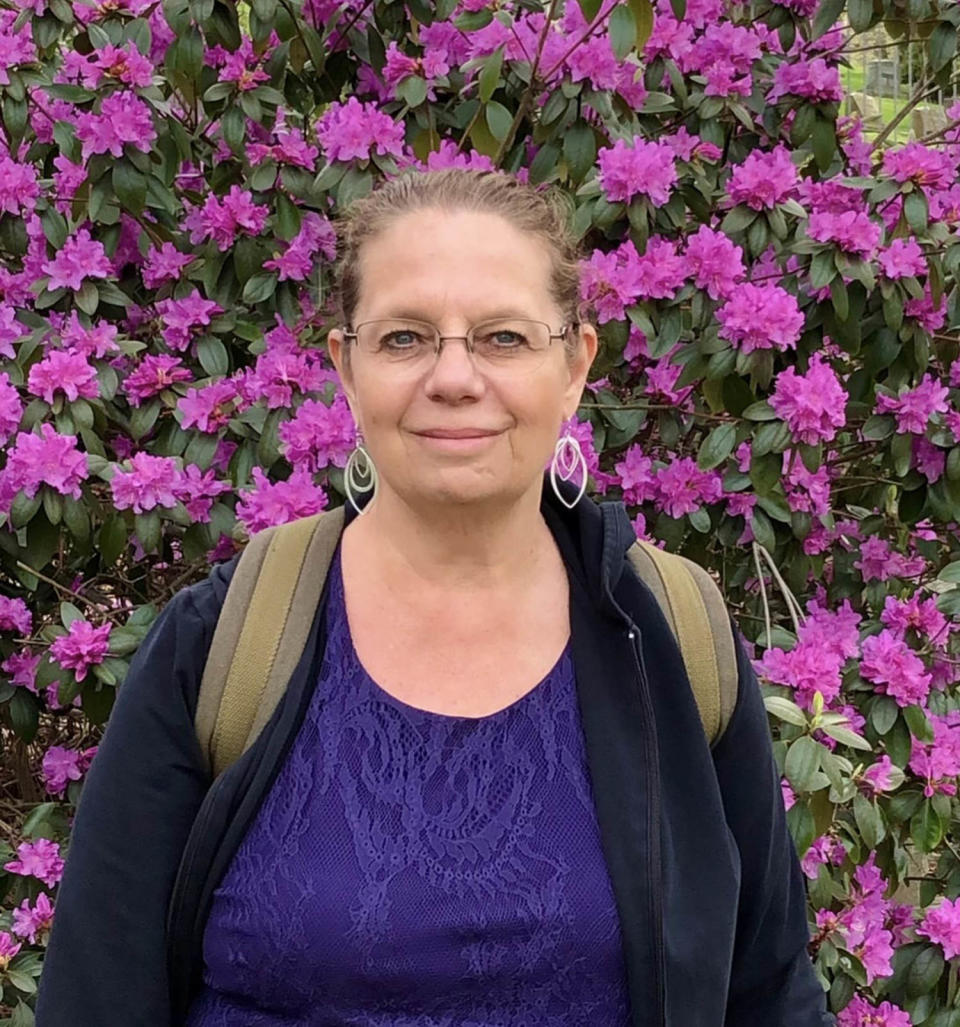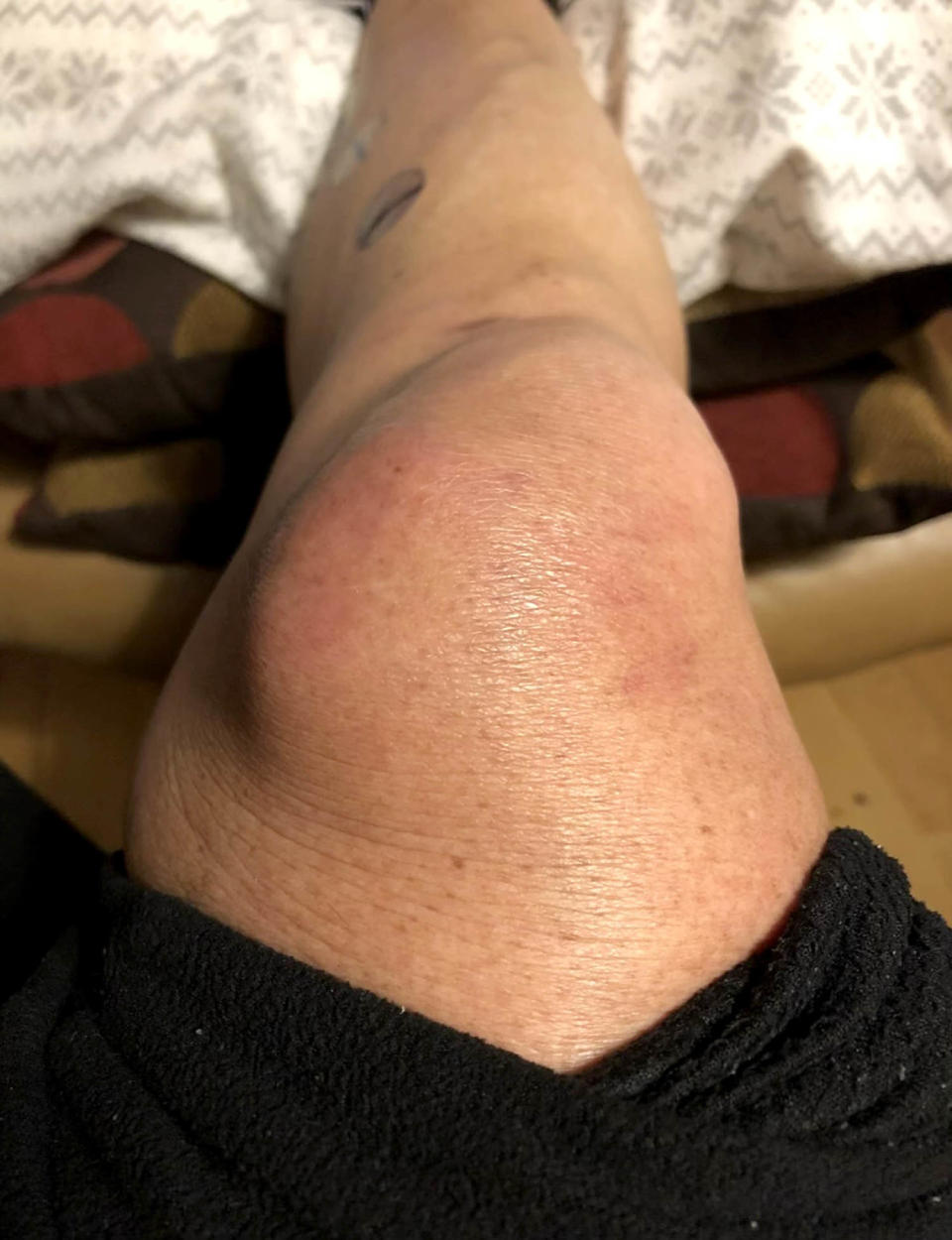Around 2016, Mary Witkop noticed a bump on the inside of her right knee. Concerned, she visited several doctors and they all agreed that the mass was likely harmless.
“I saw probably five or six doctors who all told me that it was a lipoma, which is like fatty tissue,” Witkop, 64, of Beulah, Michigan, tells TODAY.com. “I did have a doctor tell me that if it was bothering me, appearance wise, she would send me to a surgeon.”
After meeting with a surgeon in the summer of 2018, Witkop decided to delay having it removed. When she returned to meet with the surgeon months later, he noticed the bump had changed and sent Witkop for scans of the mass. In February 2019, Witkop learned why the lump grew so much in a short period of time — it was an aggressive type of soft tissue cancer.
“It had just been improperly diagnosed because nobody had done any imaging,” Witkop says. “They were just diagnosing me based on the looks.”
A bump in the knee leads to a diagnosis
When Witkop visited the surgeon in 2018, he said she’d have to keep her knee dry for two weeks if she had surgery. That meant Witkop and her husband would have to skip days on the nearby river during the hot summer months. So, she opted to wait and returned to the doctor at the end of 2018.
“He told me that it felt or looked a little bit different,” she says. “He wanted me to get some testing.”
That surgeon sent her for an X-ray and then an MRI and by February 2019, she was diagnosed with stage 3 undifferentiated pleomorphic sarcoma, an aggressive type of soft tissue cancer, according to the National Library of Medicine.
“I was really fortunate that I didn’t have the surgery in the summer of 2018 because he wouldn’t have known he was dealing with sarcoma and he probably would have not removed it properly,” Witkop explains. “Chances are my sarcoma would have spread.”
Sarcomas are rare, according to the American Cancer Society, which estimates that 13,590 people will be diagnosed with one in 2024. They’re so uncommon that Witkop struggled to find a doctor to treat it.
“There was no local doctor or hospital that I could go to that dealt with sarcoma,” she says.
Witkop traveled four hours to the University of Michigan in Ann Arbor to meet with doctors. Her treatment plan included five days of radiation for five weeks and then surgery to remove the mass. Doctors asked if she would be interested in taking part of a clinical trial looking at whether the immunotherapy pembrolizumab, also known as Keytruda, could improve outcomes for people with sarcoma.
“I was still in shock. I just had been told I have cancer,” she says. “I wasn’t comprehending what they were saying.”
When the shock wore off, Witkop thought about what participating in the clinical trial might mean to others and agreed to participate.

“I thought, ‘Well, hopefully it’ll help me, but if it doesn’t help me, it might help somebody else,’” she explains. As part of the clinical trial, Witkop received an infusion of the medication before she started radiation and then one following it. After she healed from radiation, she underwent surgery and received an infusion of the immunotherapy after surgery.
“They took a chunk out of the left side of my knee,” she says. “It was about the size of a grapefruit that they took out and then they had to take muscle from my calf and put it in the hole to fill up that gap. And then they took a skin graft from my thigh to cover the muscle.”
After, the surgeon revealed that she did not get as much of a clean margin as she would have liked because it was too close to Witkop’s bone. Doctors consider a margin clean if there’s no evidence of cancer at the tissue’s edges, indicating it’s all been removed. To get all the tissue, the surgeon would have to amputate Witkop’s leg but her surgeon decided against it. But that increased Witkop’s chances of the cancer coming back.
“It was double the likelihood of recurrence by not getting the (clean) margin,” Witkop says. “I started crying, sobbing on the spot.
Doctors considered adding more radiation to reduce the chance of recurrence, but Witkop had a bad reaction to it and couldn’t handle any more. While she felt nervous about the cancer returning, Witkop felt optimistic that being in the clinical trial would be enough.
“I was extremely hopeful,” she says. “I truly believed that if there was still cancer there and it was going to recur this Keytruda was going to save me.”
Recovery from surgery felt tough. After an 11-day stay in the hospital, Witkop went to in-patient rehabilitation closer to her home for about three weeks so she could re-learn how to walk.
“It was extremely painful,” she says. “The nurses told me that it’s one of the most painful surgeries.”
Sarcomas, a rare class of cancers
Sarcomas are “cancers that arise in the muscle and fat and blood vessels and other connective tissues,” Dr. David Kirsch, head of the radiation medicine program at Princess Margaret Cancer Centre at the University Health Network in Toronto, who did not treat Witkop, tells TODAY.com.


Sarcomas can occur more often in people with genetic mutations that make them predisposed to cancer, such as Li-Fraumeni syndrome, an inherited condition that makes people more likely to develop cancer, Kirsch says. Patients who have undergone radiation previously for other cancers have a higher chance of developing a sarcoma, he adds.
“The majority of sarcomas don’t arise from prior exposure to cancer therapy or to a genetic predisposition,” he says. Like other cancers, they develop spontaneously.
Signs of sarcoma can include a fast-growing painless lump, “bigger than five centimeters” that’s located deep in the body, Kirsch explains. But it can be tough to detect masses especially if people don’t have other symptoms.
“Theses are difficult tumors to diagnose,” Kirsch says. “They can be really challenging to treat because they are so rare.”
The sarcoma trial
“(Sarcomas) make up about 1% of all adult cancers and 15% of pediatric or young adult cancers,” says Kirsch, who led the Stand Up 2 Cancer Catalyst Research Team, which investigated immunotherapy use in sarcoma treatment.
Their rarity and complexity — there are more than 100 different kinds of sarcomas — make them challenging to study, he notes.
“That makes it difficult to make advances in sarcoma (treatment) because we don’t have the patient numbers that we do for more common cancers,” Kirsch says.
This means treatment for sarcoma hasn’t advanced in the past 25 years. Treatment typically includes surgery and radiation, he says. However, Kirsch and his colleagues decided to examine an existing immunotherapy treatment, pembrolizumab, or Keytruda, the same Witkop underwent.
They examined it on two of the more common adult sarcomas — undifferentiated pleomorphic sarcoma and dedifferentiated pleomorphic liposarcoma. He says a previous study showed that people with metastatic forms of these cancers showed a response to pembrolizumab and the investigators were hopeful that by introducing it earlier patients would benefit.
“We thought maybe if we moved (immunotherapy) up earlier in the disease course before the cancer had spread it might improve outcomes,” he explains.
The team enrolled 127 patients from the United States, Canada, Italy and Australia who were in one of two groups. One group received radiation and surgery and the second group received pembrolizumab along with traditional treatments. People in the second group had immunotherapy infusions before, during and after radiation and following surgery.
The researchers found that people who received immunotherapy with standard treatment were 43% less likely to experience relapse two years after treatment. The researchers recently presented their findings at the American Society of Clinical Oncology.
“Our hypothesis was that if we added the immunotherapy, pembrolizumab, both before surgery, while we’re giving the radiation and also after surgery that it would decrease the chance that the cancer would come back at two years,” Kirsch says. “That’s exactly what we saw.”
This finding means that some sarcoma patients have new treatment options.
“It’s a real advance and a step forward for patients with these rare tumors,” he says. “It’s an example of how we can make progress in these kinds of (rare) diseases.”
‘These studies are just amazing’
Since finishing treatment, Witkop has been cancer-free. She was able to return to work as an attorney with the Little River Band of Ottawa Indians in Manistee County, Michigan, where she provides legal advice and assistance to tribal members. Her husband and his family are tribal members.
“It’s a fabulous job,” she says. “I get to help people and not charge them. That’s just a wonderful feeling.”
While her physical health rebounded, Witkop has grappled with depression after she processed her experience with cancer.
“I don’t think I dealt with my emotions sufficiently,” she says. “I did get on an antidepressant that helped me tremendously.”
She hopes her story encourages others to consider participating in clinical trials.
“If people are offered a clinical study (I hope) they agree to be in it because it does offer hope,” she says. “Even if it doesn’t help that particular person, it might help someone in the future.”
As for her participation in research, Witkop has no regrets.
“I truly believe that this study … saved my life given the fact that my doctor wasn’t able to get the (clear) margins,” Witkop says. “These studies are just amazing.”
This article was originally published on TODAY.com

Rachel Carter is a health and wellness expert dedicated to helping readers lead healthier lives. With a background in nutrition, she offers evidence-based advice on fitness, nutrition, and mental well-being.






